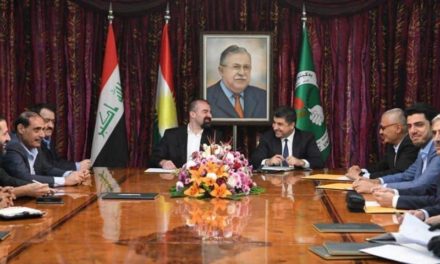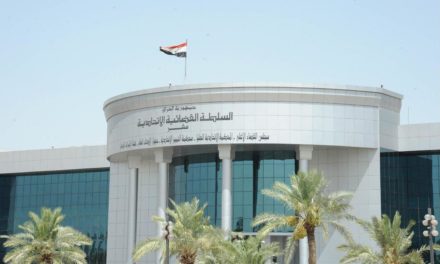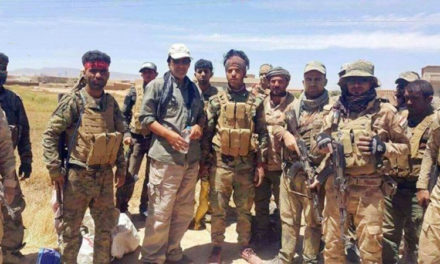Last month, Prime Minister Haider al-Abadi announced a project for the development of Iraq’s first toll road along Highway 1. While some surely read the headline as a humble infrastructure project, the privatization and development of the highway reveals a larger, highly political confrontation.
Connecting Amman to Baghdad, Highway 1 is, for many, a requisite of commercial trade. When Daesh caused the road to seal its borders in 2015, Jordanian exports to Iraq fell from $1.16 Billion in 2014 to $690 million. For others, the road is a case study in corruption and disorder. Recently, PM Abadi himself publicly denounced the elements of organized crime in Western Anbar who extort drivers and bribe travelers for safe passage.
The privatization of the highway indicates a commitment from the central government to advance infrastructure and security. But a larger question looms, with the end of an insurgency in sight, how does Iraq plan to assert control over its borders?
Much of the security and development of Highway 1 will be outsourced to familiar consulting firms of notable recognition- the Contellis Group and the Olive Group. A negotiated contract lasting 25 years will now situate Western, private services in Anbar for more than two decades- stretching from the crossing at Traibil to Baghdad.
This move will provoke two actors. First, Iran is certain to push back on the long-term presence of Americans in Iraq. Second, the presence of private, American contractors will be viewed as validation to some Iraqis with conspiratorial predilections. Jawad al-Tilaybawi, the military spokesman The Iranian-backed Asa’ib Ahl al-Haq, stated on March 30, “The US security companies are spies for the US intelligence.”
Civilian critics of the project may cite a U.S.-lite presence and, more importantly, the potential for misuse. Polling suggests more Iraqis today see corruption as the single most important concern the government must address. A physical cash toll transaction will not assuage public fears. It is easy to imagine cash finding its way to pockets rather than registers.
Conversely, proponents of the deal point to a fiscally conservative move that shifts cost from a tax levied system to a revenue system. The project will require local laborers, a move that will certainly win the support of leaders in the province.
Iraqis go to the ballot box next year, and the political landscape could dictate whether this Anbar model- that is, to raise revenue by privatization and outsource development and security- is replicated in other parts of the country. Several ports of entry (POEs) could see further development, Road 22 stretching from the Saudi border to Karbala to Baghdad, Road 12 connecting Baghdad to Qa’im, and further extension of Highway 1 from Kuwait to Safwan to Basra and connecting at Baghdad. This in addition to various positions along the Iranian border toward cities like Erbil and Suleimania and along the Syrian and Turkish border toward Mosul.
Further North, the Kurdistan Regional Government (KRG) has its own border security issues. If the Kurds attempt to keep a presence west of the Tigris, they will likely be encircled by hostility- exacerbating the ability to work in tandem with Baghdad.
To the south, the KRG has recently stepped up its tradition of irritating Baghdad. Foremost, KRG President Masoud Barzani announced on 7 June the long-delayed independence referendum for Iraqi Kurdistan- causing many to question the plan’s legality. The move drives a wedge between the central government and Erbil when security operations will be most crucial as Daesh networks dissolve. What’s more significant is a recent KRG-Russia agreement. Early this month, KRG Prime Minister Nechirvan Barzani signed a 20-year-long oil deal with Russia’s Rosneft. Per the June 2 agreement, Russia will buy KRG oil, export the oil, and refine it in Germany. As a first step, Russia will invest $3 billion in KRG territory. Baghdad naturally opposes the deal and the unwanted Russian presence on the northern border.
To the north, Turkey will likely exhaust all resources to inject itself between the potential adjacency of the Rojava in Syria and the Kurdistan regional government. Western Nineveh Province will likely see a strong Turkish hand shaping its post-Daesh direction
Iran, to the east, will also be strict to dissuade any Kurdish autonomy. Iran has attempted to leverage IRGC backed militias over the KRG. Rudaw, the media wing aligned with the Kurdistan Democratic Party (KDP), reported on 11 April that IRGC’s Qods Force commander, Qasem Soleimani visited Suleimania specifically to halt the independence referendum.
In the Kurdish Rojava to the west, tension is mounting between the Democratic Union Party of Northern Syria (PYD) and the KRG. In March, Peshmerga forces clashed with an armed group in an area controlled by the Sinjar Resistance Units (YBS) – a Yazidi group connected to the Kurdistan Workers’ Party (PKK) and trained by People’s Protection Units (YPG). The Semalka border crossing in the northern most Jazira Canton opened last year to facilitate any semblance of trade, but Kurdish infighting has scrapped normalization and sent Rojava representatives to Baghdad instead. Some in the PYD suggested the KRG and Ankara colluded to embargo the Kurdish enclave.
Baghdad’s challenges in asserting firm control over Iraqi borders are both political and tactical in nature.
During the CPA government, border security was the task of the paramilitary Directorate of Border Enforcement (DBE) (including a coast guard to patrol Shatt al-Arab and the immediate Gulf). Today, the current border police are a larger force under the command of General Hamid al-Husseini operating under the Ministry of Interior.
DBE has benefited from strong cooperation with U.S. forces. In 2015, Iraq adopted the Terrorist Interdiction Program’s Personal Identification Secure Comparison and Evaluation System (PISCES) to better identify forged documents. The Iraqi government has the capability to conduct biographic and biometric screenings at multiple land and air POEs. Both governments will need to communicate transfer intelligence, share technology, and maintain mil to mil cooperation. This American-Iraqi relationship is vital.
However, Iraq needs the funding to meet the demands of its border challenges. Organized crime and smuggling in areas like Tirbil cannot be solved by infrastructure alone. Conversely, as Daesh suffers defeats on the battlefield, it will be driven both underground and across borders. Security operations will change in nature. Baghdad, Washington, and international partners need to be ready to adapt.

Brandon Louis Wallace
Brandon Wallace is an independent Middle East researcher and a graduate of Duquesne University.










